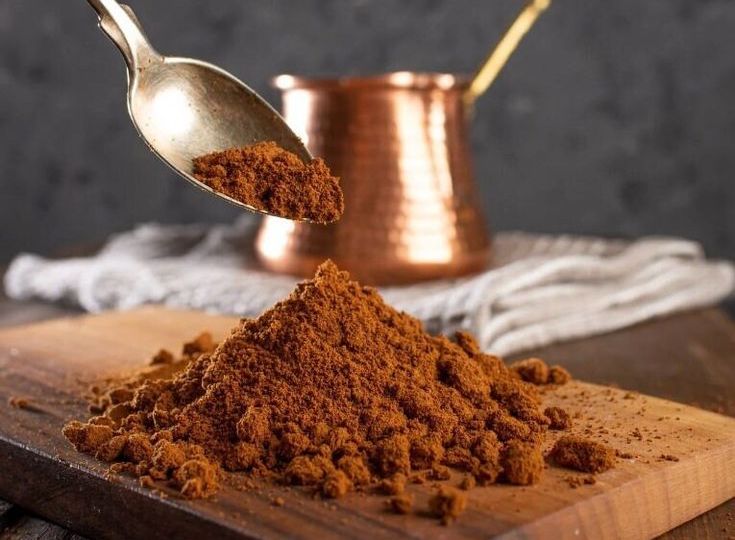
Turkish Coffee Powder is more than just a key ingredient for a beloved beverage; it’s the heart of a centuries-old tradition that mesmerizes with its rich flavors and unique preparation method. Unlike any other coffee experience, Turkish coffee offers a journey into a culture that prizes the art of coffee making and sharing.
This finely ground coffee powder, when brewed correctly, produces a cup that is strong, flavorful, and deeply aromatic, encapsulating the essence of Turkish hospitality and the country’s rich history. The preparation involves a cezve or ibrik, a special pot that gently simmers the coffee to perfection, creating a layer of foam that coffee aficionados cherish. The ritual of enjoying Turkish coffee is a time-honored tradition, reflecting the Turkish adage that coffee should be “black as hell, strong as death, and sweet as love.”
Key Takeaways
- The Significance of the Fine Grind of Turkish Coffee Powder: The ultra-fine grind is what sets Turkish coffee apart, creating a dense, velvety texture and an intensely robust flavor that is unmistakably unique.
- The Cultural Importance of Turkish Coffee in Various Regions: Beyond its delightful taste, Turkish coffee serves as a cultural linchpin across regions, symbolizing hospitality, friendship, and a deep-rooted history. It’s more than a drink; it’s an experience shared across generations.
- Differences Between Turkish Coffee and Other Coffee Types: Unlike the quick espresso shots or the filtered drip coffee, Turkish coffee’s brewing process allows flavors and oils to fully develop, offering a stronger cup with a body that’s hard to replicate with other brewing methods.
- Health Benefits and Caffeine Content: Turkish coffee is not only known for its bold flavor but also for its health benefits, including a rich source of antioxidants. While it’s potent, the caffeine content is balanced, offering a spirited lift without the jitters commonly associated with stronger coffee brews.
- Recipe and Preparation Tips for Making Authentic Turkish Coffee: Achieving the perfect cup of Turkish coffee is an art, involving precise water-to-coffee ratios, the right heat, and the patience to allow the coffee to brew to its full glory without rushing the process.
The History of Turkish Coffee
The story of Turkish coffee is as rich and captivating as the beverage itself. Tracing its origins back to the 15th century, Turkish coffee first brewed its way into history in the Sufi monasteries of Yemen. It wasn’t long before this enchanting drink found its way to the Ottoman Empire, capturing the hearts and palates of the Turks. The Ottomans refined the art of coffee making, turning it into a cultural cornerstone that symbolized hospitality and camaraderie. By the 17th century, Turkish coffee had woven itself into the social fabric of the empire, becoming an indispensable part of ceremonial customs and daily life.
As the Ottoman Empire expanded, so did the popularity of Turkish coffee, reaching the corners of Europe and beyond. Coffee houses quickly sprouted up in major cities, becoming hubs of social activity, intellectual discussion, and political debate. The global journey of Turkish coffee not only spread the taste for this unique beverage but also its cultural significance, making it a symbol of warmth and friendship around the world.
What Makes Turkish Coffee Unique?
What sets Turkish coffee apart is not just its bold flavor but the meticulous process behind its preparation. The foundation of this distinct coffee lies in its ultra-fine powder grind, finer than what’s used for espresso, creating a smooth and concentrated brew. This fine grind is pivotal, allowing the coffee to fully amalgamate with the water and develop its characteristic texture and taste.
The brewing of Turkish coffee is an art, performed with a special pot known as a cezve or ibrik. This traditional copper or brass pot, equipped with a long handle, is essential for the slow cooking method that Turkish coffee requires. The coffee is carefully heated to just below boiling, allowing a foam to form without letting the coffee actually boil. This technique is crucial for achieving the coffee’s signature foam layer, which is considered a sign of a well-made cup.
Turkish Coffee Preparation: A Step-by-Step Guide
Preparing Turkish coffee is an art that combines technique with tradition, resulting in a cup that’s rich in flavor and steeped in history. Here’s a step-by-step guide to making authentic Turkish coffee:
- Measure the Ingredients: For each cup, use one cup of cold water. Measure about one heaped teaspoon of Turkish coffee powder per cup into the cezve (Turkish coffee pot). If you prefer sweet coffee, add sugar to taste at this stage.
- Mix: Before placing the cezve on the heat, stir the coffee and sugar (if using) with a little cold water to make a smooth paste. This helps to prevent lumps.
- Slow Heat: Place the cezve on low heat. This slow brewing process is key to allowing the coffee to fully infuse with the water. Do not stir once it’s on the heat, as stirring can prevent the foam from forming properly.
- Watch the Foam: As the coffee heats, a dark foam will begin to rise. Just before it boils over, remove the cezve from the heat. Spoon a little of the foam into each coffee cup.
- Return to Heat: Put the cezve back on the heat and allow it to come to a boil again, watching carefully to prevent it from boiling over. Repeat this process 1-2 more times to develop a rich flavor and increase the amount of foam.
- Serve: Pour the coffee into cups, dividing the remaining foam equally among them. Allow it to sit for a moment so the grounds can settle to the bottom of the cup.
- Enjoy: Turkish coffee is traditionally served with water and something sweet on the side, like Turkish delight or chocolate.
The Cultural Significance of Turkish Coffee
Turkish coffee is much more than just a beverage; it’s a symbol of hospitality, friendship, and tradition. In social settings, offering Turkish coffee to guests is considered a gesture of welcome and respect. It plays a central role in important ceremonies, especially in weddings where it’s used to formalize marriage proposals. According to tradition, the bride-to-be prepares Turkish coffee for the prospective groom and his family, with the groom’s coffee sometimes made salty to test his character.
Fortune-telling using the coffee grounds left in the cup, known as tasseography, is another unique aspect of Turkish coffee culture. After enjoying the coffee, the cup is turned upside down onto the saucer, and once it’s cool, the patterns of the grounds are interpreted to tell the person’s fortune.
Comparing Turkish Coffee with Other Coffees
Turkish coffee, espresso, and Greek coffee share a love for rich, concentrated coffee experiences but differ markedly in their preparation, flavor profiles, and caffeine content.
Preparation & Flavor: Turkish coffee is unique for its very fine powder-like grind and slow brewing method in a cezve, producing a thick, velvety coffee with a layer of foam on top. The coffee grounds are left in the cup, offering a distinctive texture and an intense, deep flavor. Espresso, on the other hand, is prepared under high pressure, extracting a concentrated shot with a notable crema.
This method highlights the coffee’s acidity and aromatic oils, resulting in a smooth, potent shot. Greek coffee, closely related to Turkish coffee, is also finely ground and slowly brewed but often has a slightly different flavor profile due to variations in beans and roasting methods.
Caffeine Content: When it comes to caffeine, Turkish coffee packs a surprising punch despite its small serving size, often containing more caffeine per ounce than espresso. However, the total caffeine content in a single serving is generally less than a standard espresso shot due to the smaller overall volume. Compared to Nescafe or other instant coffees, Turkish coffee offers a more natural and robust caffeine boost, with instant coffees generally having less caffeine and a different flavor profile due to the processing they undergo.
Health Benefits and Caffeine Content
Turkish coffee is not only known for its rich cultural heritage and unique taste but also for its health benefits. Being unfiltered, it retains more of the beneficial compounds found in coffee beans. These compounds have been associated with improved heart health, better cognitive function, and a lower risk of certain diseases. The ritual of drinking it slowly and in small quantities can also offer a more mindful coffee experience.
Caffeine Comparison: Despite its strong flavor, Turkish coffee’s caffeine content is somewhat balanced, providing a hearty dose that energizes without overwhelming. In comparison, espresso, known for its quick, intense caffeine hit, may contain more caffeine per ounce but is usually consumed in smaller quantities.
Instant coffees like Nescafe vary in caffeine content but typically offer a more diluted caffeine experience due to their processing. Turkish coffee stands out as a healthy, traditional alternative that delivers both flavor and a moderate caffeine kick.
FAQs
What are the differences between Turkish and Arabic coffee?
While both Turkish and Arabic coffee use finely ground coffee beans, Arabic coffee often includes the addition of cardamom or other spices. Turkish coffee is generally served without additives, focusing on the pure, rich taste of the coffee itself.
Can I make Turkish coffee in a regular coffee maker?
Traditional Turkish coffee requires a specific brewing method that is difficult to replicate with a regular coffee maker. The unique taste and texture of Turkish coffee come from its fine grounds and the slow brewing process in a cezve or ibrik, which a conventional coffee maker can’t achieve.
Is it okay to add milk to Turkish coffee?
Typically, Turkish coffee is consumed black without any milk or cream. Adding milk can significantly alter the traditional flavor and consistency of the coffee. However, personal preferences vary, and some may choose to add a small amount of milk.
Final Thoughts
Turkish coffee isn’t just a beverage; it’s a cultural experience steeped in tradition and history. Its unique preparation method, from the fine grind of the coffee beans to the meticulous brewing process, creates a coffee experience that’s rich in flavor and steeped in ritual. Whether you’re a coffee aficionado or someone curious about different coffee cultures, making Turkish coffee at home is a delightful journey into a rich and aromatic world.









